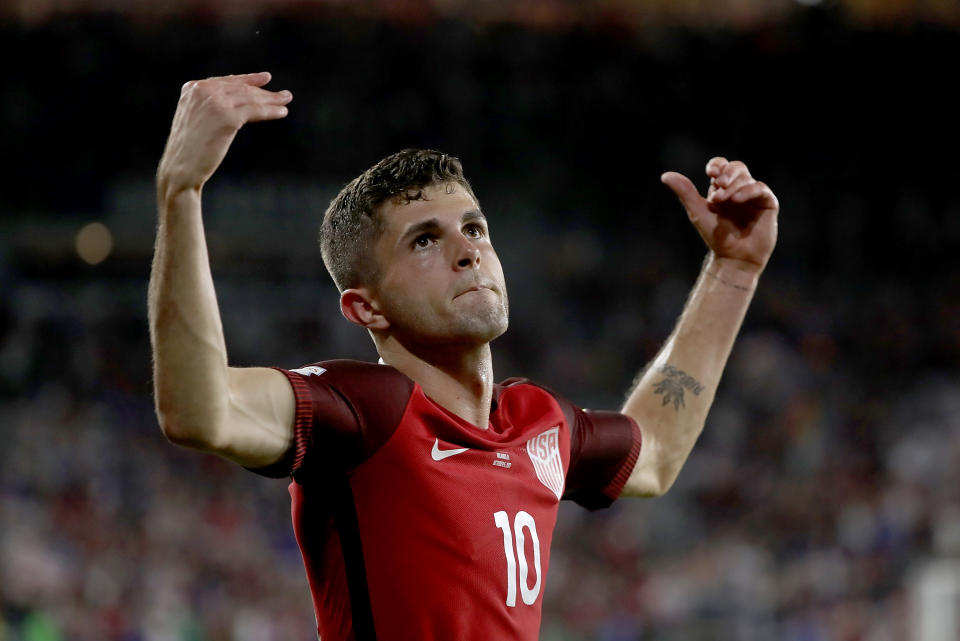Christian Pulisic lost the most by the U.S. missing the World Cup
There is, of course, not a single United States men’s national team player who is happy about his nation’s absence from the 2018 World Cup.
In Russia, an entire generation of USA stalwarts would have likely had a last big hurrah. All-time leading scorer Clint Dempsey, tied with Landon Donovan, could have broken the record there; long-time starting goalkeeper Tim Howard might well have been a starter at an unprecedented third World Cup; and even the old war horse DaMarcus Beasley could have made the team for a fifth World Cup. They were looking to finish their national team careers at the summit of the sport.
It’s not inconceivable that Michael Bradley, who will turn 35 days after the next World Cup in 2022, missed his last chance as well. That’s even true of Jozy Altidore, who will still only be 32 four years from now, but who has been besieged by injuries at the most inopportune moments — which is to say nothing of all the soccer he already has in his legs after 110 caps and a professional debut as a 16-year-old.
Those five make up fully half of the all-time top-10 in U.S. appearances. And for most of them, their U.S. careers might well have ended with the biggest letdown in the game’s history stateside, although it may yet be punctuated by some sort of testimonial game.
Yet missing out on the World Cup is quite possibly even more painful for a player at the start of what promises to be a long U.S. career, rather than at the end of it. A player like Christian Pulisic.
The 19-year-old phenom has likely already had the most productive European career of any American outfield player, with 69 Bundesliga and 21 Champions League and Europa League appearances for German power Borussia Dortmund. (The possible alternative for that title is Dempsey and his 57 Premier League goals.) And Pulisic was set to thrive in Russia, regardless of the limping team he’d have been surrounded by.

This World Cup would surely have made Pulisic a star, casting on him the sort of shine mainstream American culture only sends soccer’s way every four years. Suddenly, our best players get booked on the afternoon and late night talk shows and appear on magazine covers. And the mainstream media would have been all over Pulisic.
He’s talented in a way no soccer-playing countryman has ever been, Freddy Adu included; he oozes the sort of boundless promise this country has never been able to resist; and he offers an answer to that tired question about the long-awaited American superstar.
What’s more, Pulisic is well-spoken beyond his scarce years and handsome in the most marketable of ways: boyish and entirely unthreatening — even when he yells at opponents or referees, worked up into a full rile, he’s sort of cuddly.
This World Cup would have made him more famous stateside. And it would have set him on a path toward the kind of wealth that’s been elusive for American soccer players.
Not that you should worry for Pulisic. He reportedly earns about $1.2 million annually at Dortmund, which isn’t counting national team bonuses and endorsement money. But the kind of exposure he missed out on could have landed Pulisic a portfolio of Fortune 500 sponsorships. The unlikely American elimination from World Cup qualifying in Trinidad and Tobago in October, when a confluence of fluky results conspired uncannily to punish the poor U.S. performances, might well have cost him millions of dollars.

There are more World Cups for Pulisic to play. By the good fortune of his birth year, more will come around when he’s 23, 27, 31 and 35. He could, in other words, still play in four World Cups. But his stateside stardom will nevertheless be delayed.
And that’s to say nothing of the impact on his actual playing career. World Cups tend to accelerate progress at the club level. A good showing at the World Cup can speed up a move to a bigger club by a season or two. The post-World Cup value surge for players who stood out in a small sample size of games perhaps isn’t entirely rational, but it’s very real. Pulisic has reportedly been the target of bigger clubs like Liverpool for years — where his former coach Jurgen Klopp is now in charge — but it’s never happened. A solid World Cup might have finally pushed it through.
Pulisic quickly made the national team his own in 2016 and 2017, as he became a regular in World Cup qualifying. Soon enough, he had 20 caps and nine goals to show for it — not to mention a big tattoo of an American eagle and flag.
But this World Cup would have made him an American star. And the loss of that opportunity, both on the field and off it, is surely a steeper price to pay for failing to qualify than that of any of his teammates.
Leander Schaerlaeckens is a Yahoo Sports soccer columnist and a sports communication lecturer at Marist College. Follow him on Twitter @LeanderAlphabet.
More soccer from Yahoo Sports:
• 2018 World Cup preview hub
• FC Yahoo Mixer: Consequenes of USMNT’s World Cup absence
• How Putin can use the World Cup to his benefit
• FC Yahoo Mixer: The Ronaldo vs. Messi debate
• Jurgen Klinsmann, Bruce Arena open up about USMNT qualifying failure



